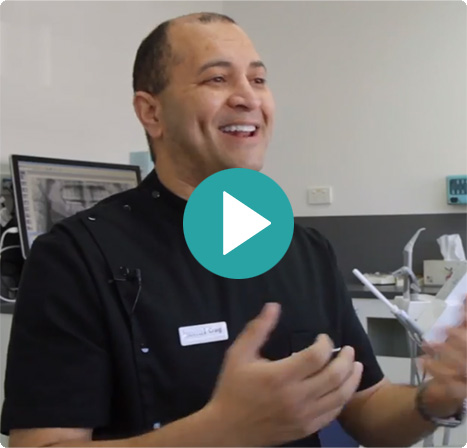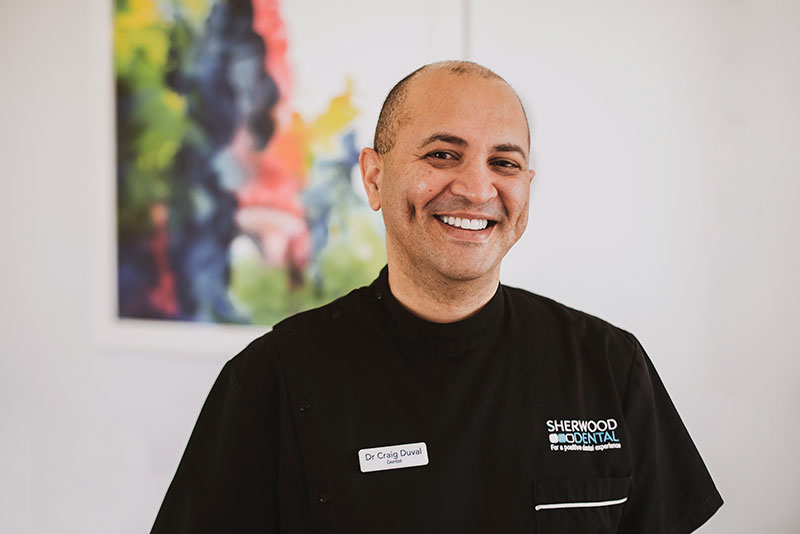Dental Implants Brisbane
Dr Craig Duval places dental implants at Sherwood Dental, in Southwest Brisbane.
Dental Implants in Brisbane
Dental implants can:
- Replace one or more missing teeth, permanently
- Restore your ability to chew
- Improve your smile – no obvious large gaps in your grin!
- Encourage retention of the jawbone, which starts to shrink away once teeth have been removed
- Prevent the face collapsing in, once teeth have been removed
- Prevent your bite collapsing, which can lead to TMJ disorder symptoms: limited opening, pain, clicking joints, jaw locking, headaches

How do dental implants work?
Dental implants are widely considered to be the latest innovation in modern dentistry to replace missing teeth. At Sherwood Dental we offer dental implants to help our patients regain the function of their teeth, and the appearance of their smile. We provide dental implants for our patients in Sherwood, Indooroopilly, Chelmer, Rocklea, Oxley and Southwest Brisbane.
A dental implant is made from a small artificial titanium rod which is implanted directly into the jawbone, acting as a replacement for the missing tooth root. This then preserves both the jawbone and the gum height, which is best for the health of both the implant and the other remaining teeth.
Titanium implants promote growth of new bone cells on the implant surface. Once enough bone has grown around the implant, it’s considered to be integrated with bone (‘osseointegration’), and a crown or bridge can be fitted on top. This process can take anywhere from three to six months.
A dental implant can be beneficial for a number of reasons and can be used to replace:
A Single Tooth
A single implant is placed in the jawbone, and once integrated, a crown is made to fit on top.
Multiple Teeth
For multiple missing teeth, the numbers of implants needed can vary. Restorations (on top of the implants) can also vary – single crowns (one per implant) may be recommended, or perhaps an implant bridge. For adjacent missing teeth (all on the lower right, for example), you may not necessarily need one implant per missing tooth. At your consultation, Dr Craig Duval will determine the best position for your implants, and what type of restorations are best.
An entire arch, or both upper and lower arches
If you’re missing all your upper or lower teeth, implants may still be possible. It depends on how long the teeth have been missing, and how much of the jawbone is still there. It may be possible to place 4 implants (spread across your upper or lower jaw), with an implant bridge or implant denture permanently attached on top.
Choosing the right dentist for your dental implant procedure
Your experience and the success of your treatment is highly dependent upon choosing a skilled dentist that understands your concerns. Dr Craig Duval is very experienced with both restorative dentistry and dental implants. Communication is also vital, so he will take the time to discuss your needs, and thoroughly examine your mouth to ensure the dental implants are a suitable option for you.
A consultation appointment (including x-rays) with Dr Craig Duval is necessary to determine if you are a suitable candidate for dental implants. During this consultation, we can also explain the process of placing a dental or tooth implant to keep you fully informed. A treatment plan will then be drawn up by Dr Craig Duval and discussed with you, detailing all the foreseeable appointments required and the costing.
How are the dental implants placed?
After we have completely discussed the process with you, you will be administered with a local anaesthetic to numb the area around where the implant is being placed. For our patients who are more anxious, oral sedation (Valium) can be given in order to relax you. Once we have identified the ideal placing, an incision will be made in the gum where the implant is going to be placed. This will then expose the bone in order for Dr Craig Duval to then drill a small hole into the jawbone.
The titanium implant screw is then expertly inserted into the bone. A protective cover or ‘healing cap’ will then be placed over the top of the screw. This will then be either left visible in the mouth, or alternatively if the implant is deep in the jawbone the gum will then be stitched over the healing cap. A temporary denture or temporary crown can be made for front teeth, but this will incur an additional cost.
The implant is left to heal for 3 to 6 months to allow the new bone to integrate with the implant (‘osseointegration’). This process is extremely important to the success of the implant. The success rate of implants is around 98% (apart from in smokers and diabetics).
Once the implant has integrated with the jawbone, the healing cap can then be removed. The final crown or bridge is then made, and either screwed or cemented down onto the implants (with abutments in between).
Looking after your implant
Good oral hygiene and regular check-ups at Sherwood Dental are an essential part of looking after your implants as the gums must remain healthy. If properly cared for, the implants can last a lifetime. Dr Craig Duval and the Sherwood Dental team are committed to the long term success of your implant, and we hope you are, too!
Ask Dr Craig Duval
To find out more about dental implants, or to book an appointment with Dr Craig Duval, please contact us today.

